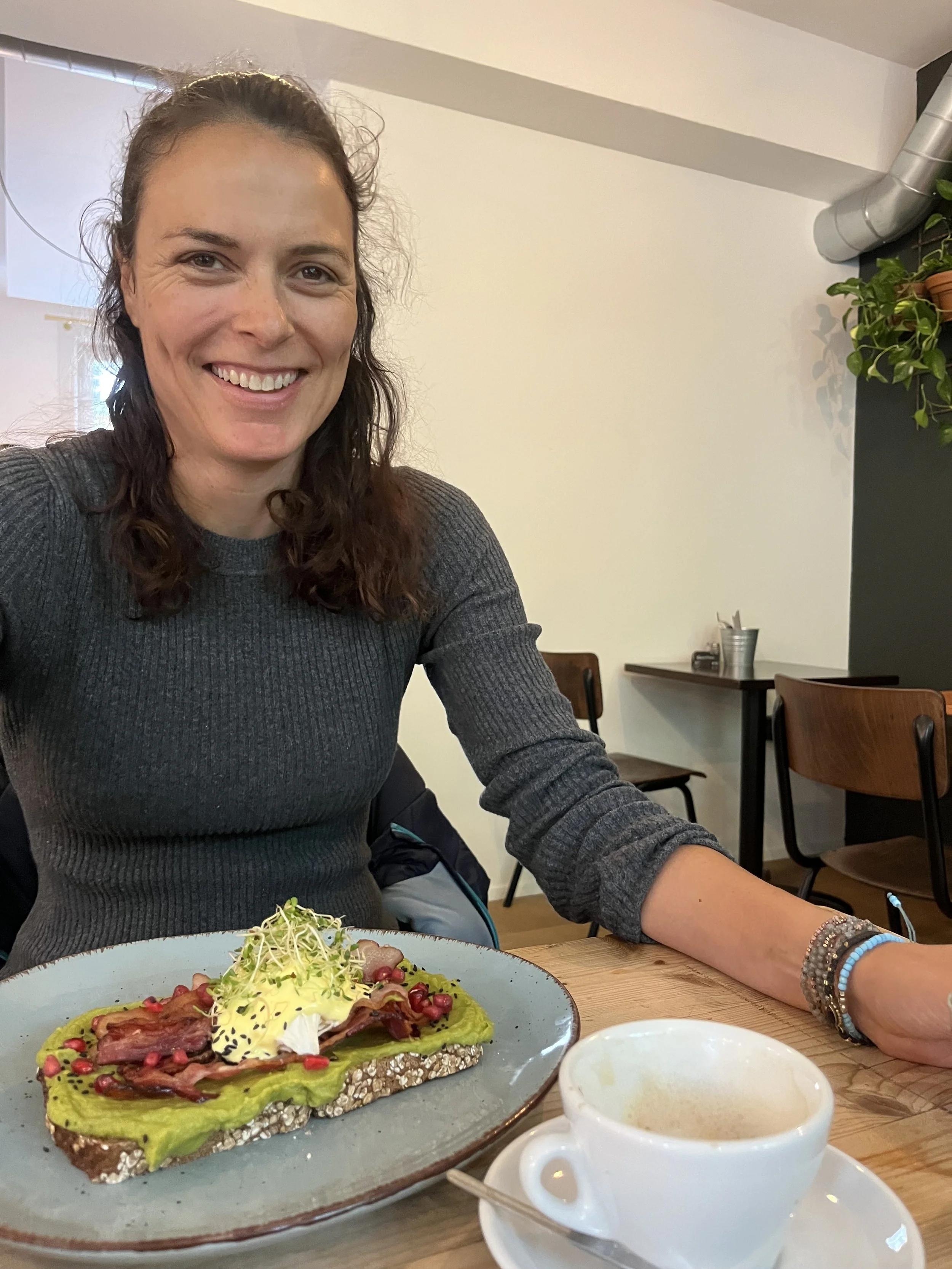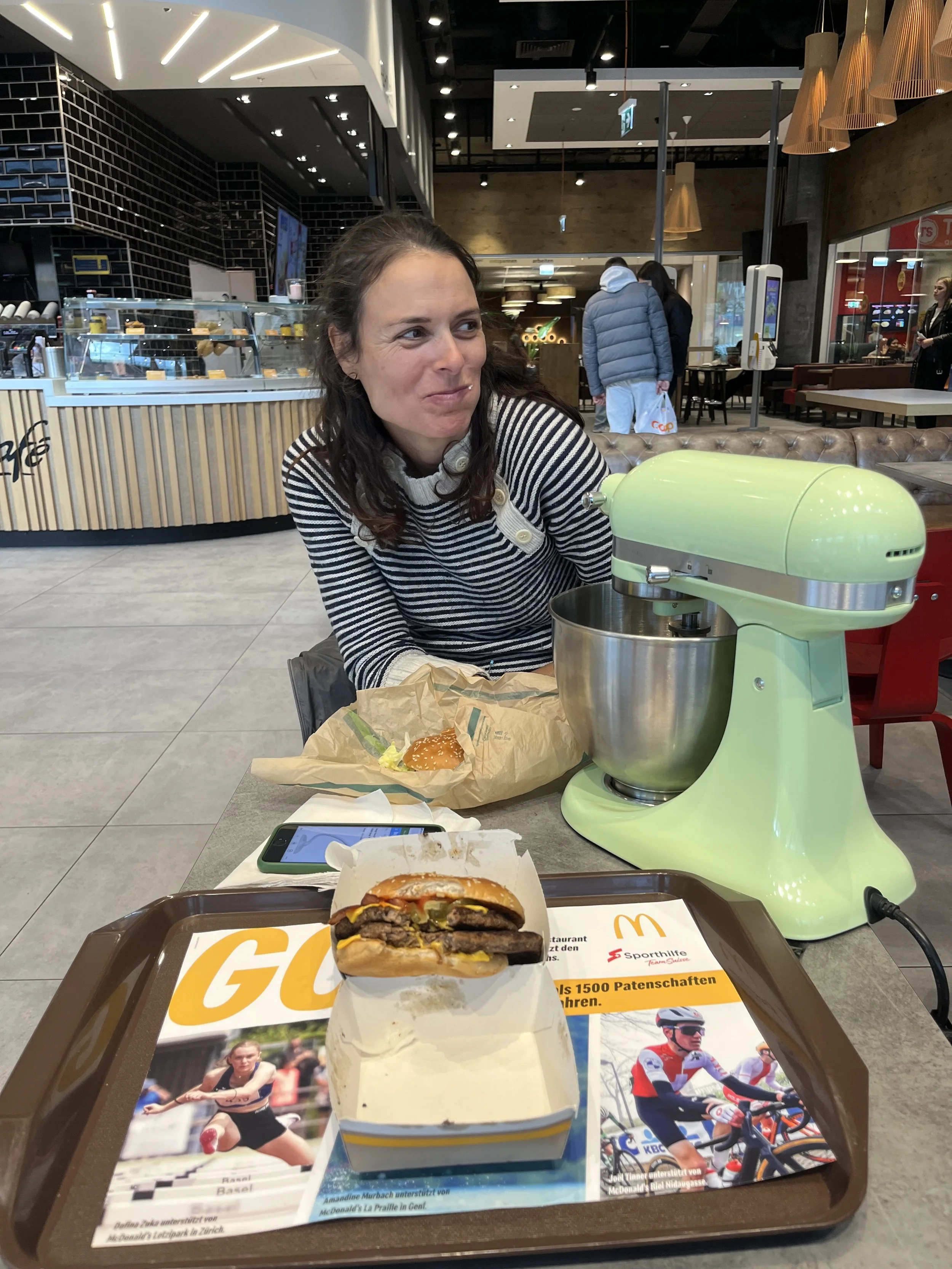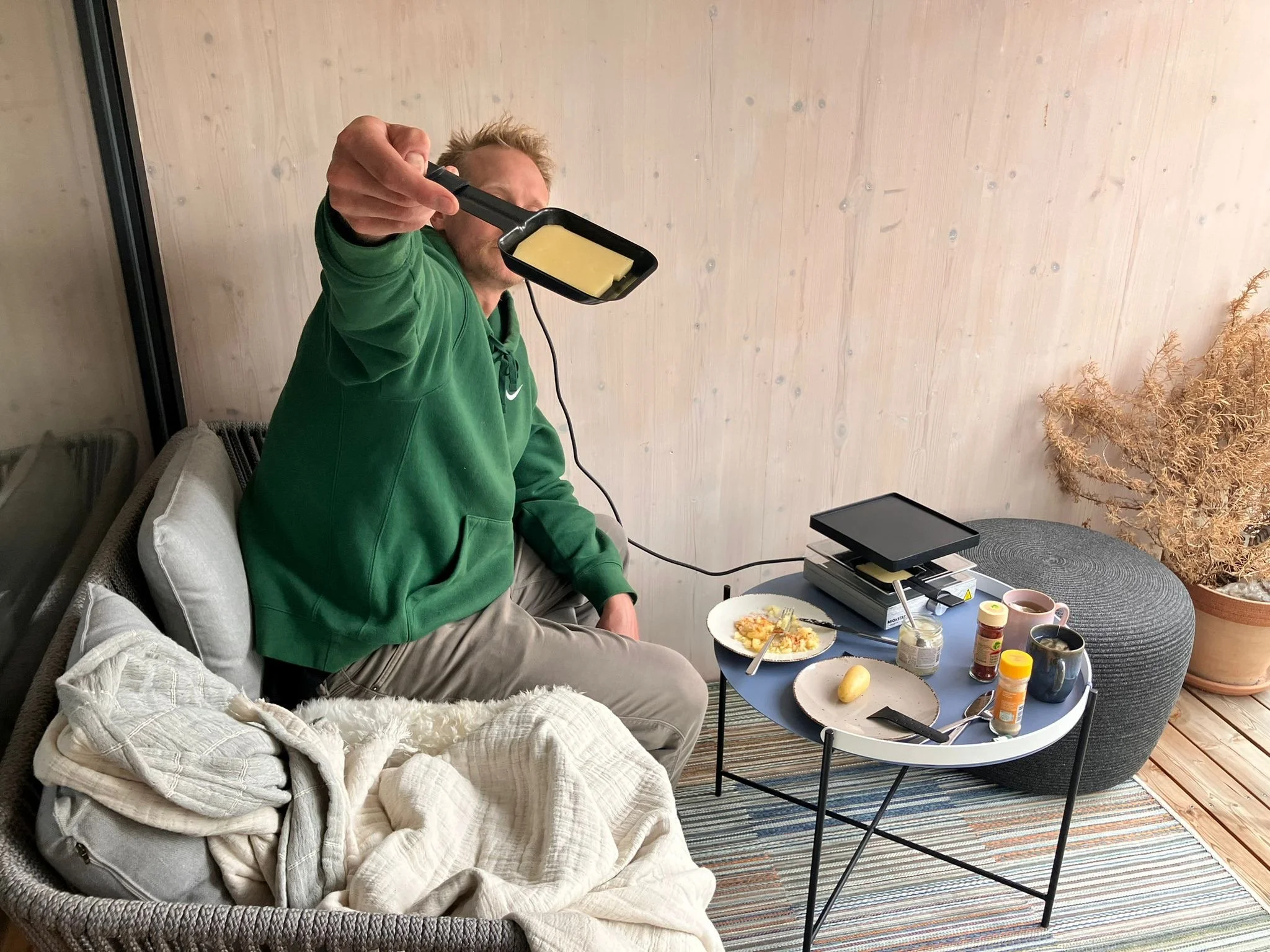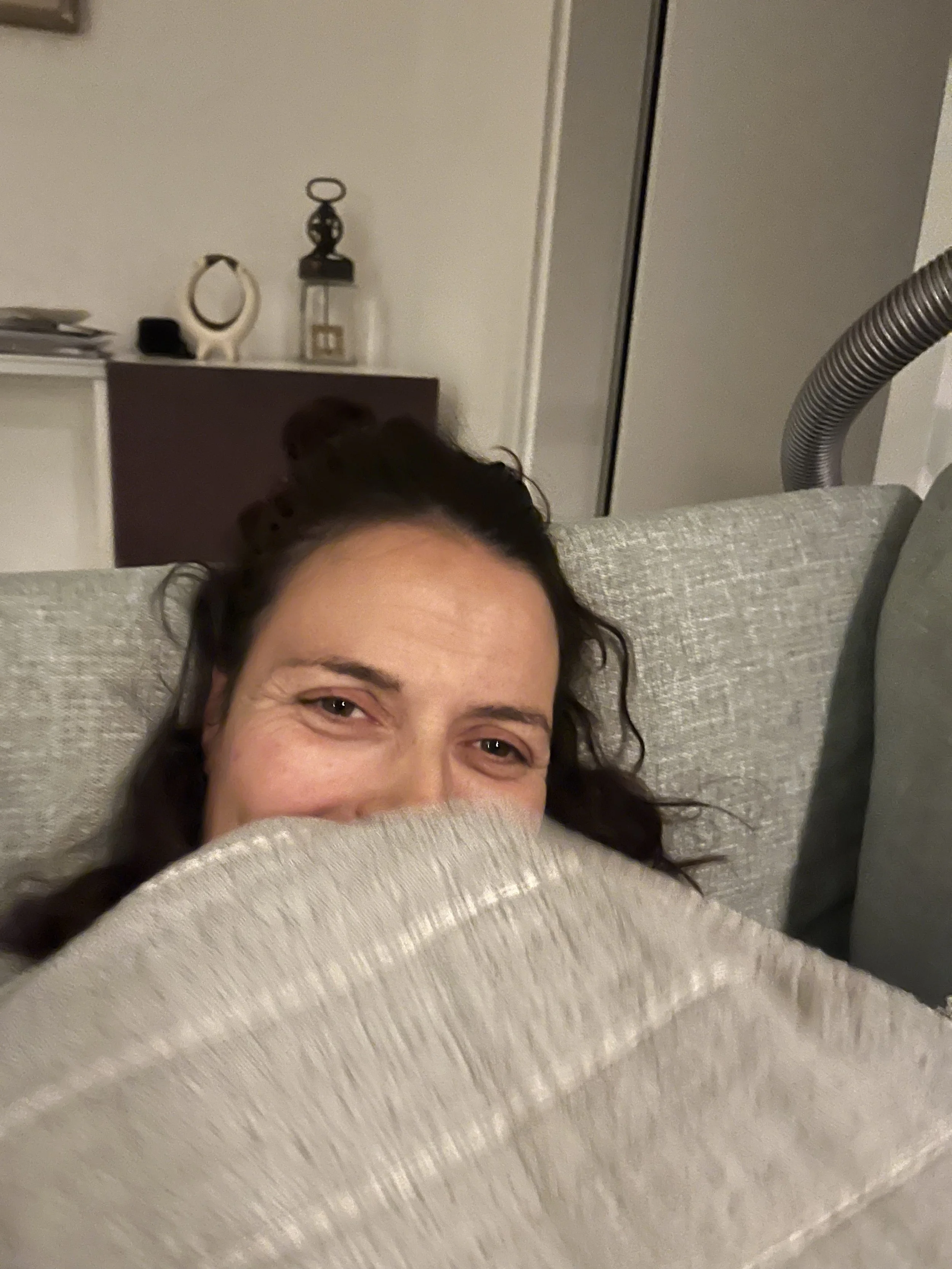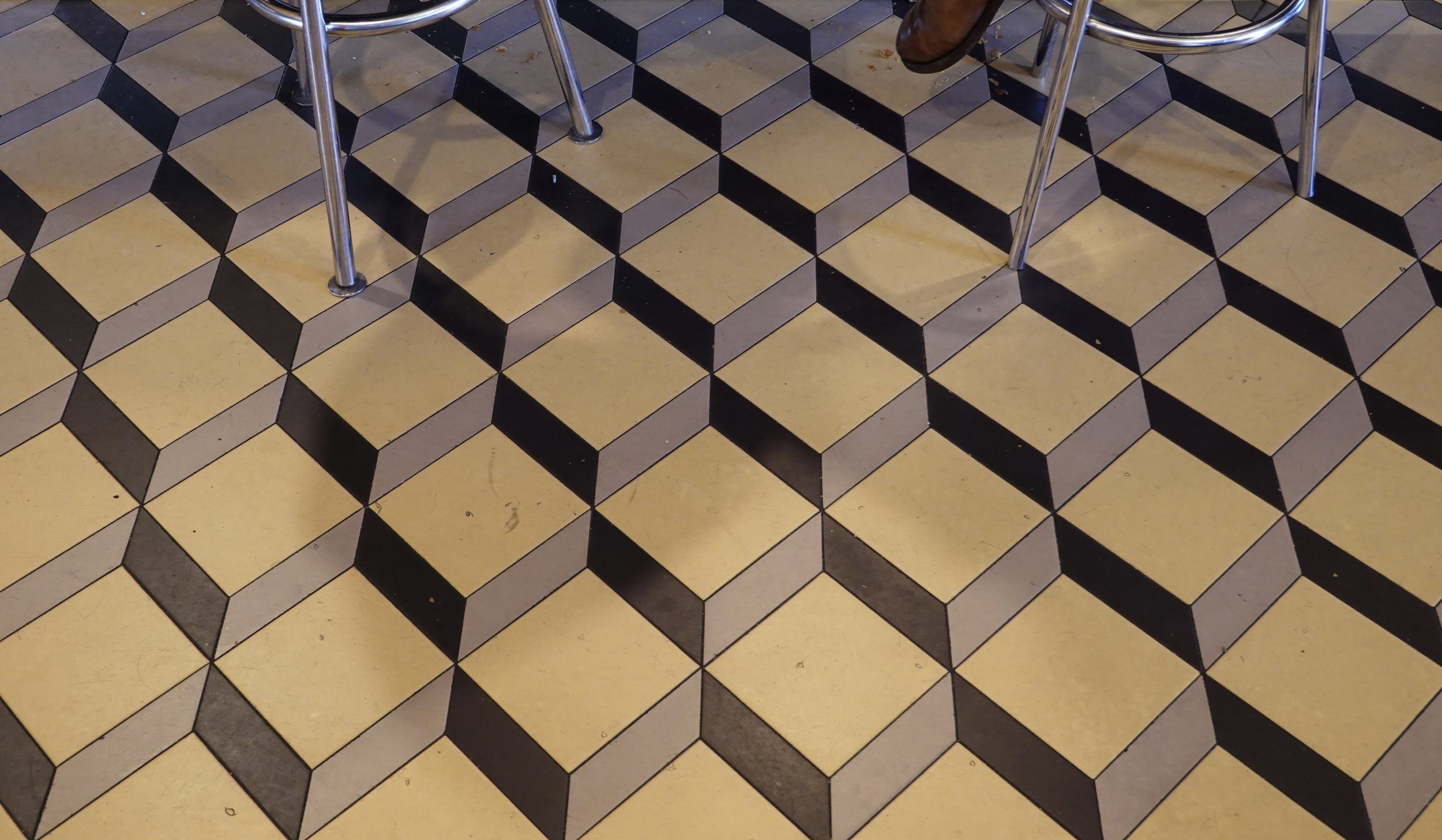
Fluent on Duolingo, Clueless in Real Life:
An Expat’s Struggle Learning German in Switzerland
September 12th was Nicole’s birthday and naturally, we celebrated by moving our crazy array of things into our second sublease. Yippee!! This one was a sleek, modern apartment tucked into the Breitenrain neighborhood (or Breitsch, as any proud local would call it). Amid the chaos of unpacking, we carved out space for celebration.
Our day began at Becanto, a cozy neighborhood spot that looked promising until we met its sad excuse for avocado toast. Daydreaming as we ate it how we could master the “avocado toast” ourselves for our future bed and breakfast.
Next stop: the mall, where fate handed us a sick-ass, green KitchenAid mixer for 100 bucks,(old model) a score we celebrated with a greasy ass McDonald’s lunch. Then Nadine, Nicole’s sister (a musician: Naluma), popped in with a homemade cake and helped me serenade Nicole with a heartfelt rendition of “Happy Birthday.”
As the sun dipped behind the rooftops, we melted raclette on our new porch. A slow, romantic stroll followed, hands tucked into one another’s jackets, the city quiet around us, before finally crashing on the couch for some much needed R&R.
Deutsch Zeit
After things settled down in Switzerland, baby on the way, visa drama out of our under control, I figured it was time. Time to finally take that German course I’d been meaning to enroll in since we arrived.
Back in the States, I’d logged hours on Duolingo. But after two months in Switzerland, it was painfully clear: those green owl sessions hadn’t taken me far. I took a few online placement tests and every one of them shoved me straight into the beginner basement: A1.1.
Which frankly, i felt was a load of crockshit.
Sure, I was no where near fluent, but my vocabulary wasn’t that shabby, i could lasso up some basic sentences, order a coffee, talk about my weekend or the weather, hell, i could even throw out an occasional “genau” with a confident flare. I was even starting to wrap my head around the inside-out logic of German sentence structure. Where the verb sometimes just casually chills at the end of the sentence , so you’ve got to hold everything in your head until the final word finally shows up like, “Surprise!”
But, the second a conversation got remotely interesting, I stood there like a dumb mute.
Grammar: The Real Villain
But all of that was manageable. What really kept me finger painting in the corner, diaper full of shit and eyes glazed, was the grammar. That bureaucratic hellscape of articles, case endings, split words and gendered nouns.
In English, we’ve got one: the. That’s it. Easy. In German, you’ve got der Tisch (masculine), die Lampe (feminine), and das Fenster (neuter). Get it wrong and your basically wearing a neon shirt saying: I’m a dumb.
Then come the cases:
Nominative (subject): Der Hund beißt — The dog bites.
Accusative (object): Ich sehe den Hund — I see the dog.
Dative (indirect): Ich gebe dem Hund ein Buch — I give the dog a book.
All three describe the dog. All three use different grammar. In English? “The dog” stays “the dog.” That’s it.
Then you’ve got adjective endings that change depending on gender, number, and case (ein schöner Tag, eines schönen Tages, dem schönen Tag).
Then you have separable verbs like abbiegen (to turn off). Suddenly ab scurries to the front of the sentence and biegen gets exiled to the end. You get Frankenstein sentences like:
“Ich biege an der Ampel ab.”
Literally: “I turn at the light off.”
Even numbers are backward. 25 becomes fünf-und-zwanzig — “five and twenty.” (fünf und zwansk in Swiss German.). Numbers! Humanity’s first universal language, figured out by Mesopotamians 5,000 years ago. But somewhere along the way, the Germanic world went, in a Homer Simpson voice: “Heh heh, lets do it this way…”
Plural forms? There are no rules. Das Buch becomes die Bücher. Der Apfel becomes die Äpfel. Sometimes you add -e, sometimes -en, sometimes -er and sprinkle in an umlaut like peppa. Good luck.
And don’t get me started on compound words. I once tried to say “speed limit” and the word they taught me was Geschwindigkeitsbegrenzung.
But German Has Its Upside
Despite all that ranting about how German feels like a joyless government form. I’ll admit:
German has range.
Coming from English, where you often need multiple short sentences to explain nuance, in German, you can sculpt it all into one tidy grammatical knot. It’s built for precision.
Someone once told me English is like a piano—press a key, get a note. German? It’s a violin. You don’t just say something. You shape it. You inflect it.
But me? I wasn’t trying to compose a symphony. I just wanted to talk.
In Way Over My Head
Despite bombing every placement test, I signed up for a trial class at Alemania, a budget-friendly language school in Switzerland. I sat in on an A1.2 course, above my level, and, surprise surprise, didn’t understand a thing. But a kind girl next to me leaned over and nonchalantly suggested:
“Save your money. Just jump to A1.3. You’ll be fine.”
Hell, when life tells you you’re ready, you’re ready! Buckle up, cowboy…
I enrolled in A1.3 and immediately realized I was playing football with a baseball bat. Monday - Friday day at 13:30 came a new chapter, new grammar, new vocab. Instructions were in German. No English. I sat there after the teacher explained the instructions like: “WTF are we doing?”
Since i didn't understand shit, i had plenty of time to take in my classmates and get to know them, namely, my classmate that invited, or, challenged me to take the a.1.3 course. She turned to me and asked in English:
“What brought you to Switzerland?”
I smiled. “Love. My wife is Swiss. After 14 years in the States, we moved here so she could reconnect with her family.”
Curious, I asked her the same question.
“I’m from Ethiopia. I had to come here because of the Tigray war. So... not for love.”
A Lesson in Perspective
Her words landed with a silence I didn’t know how to fill. My dumbass barely knew anything about Ethiopia, some fast runners and a vague idea that it was in Africa, maybe?
Here i am, all hunkie-dory, chose to come here, got my own apartment, from the land of liberty and justice for all, ignorant of anything outside of its red white and blue borders. I was embarrassed, feeling like a cold turd and didn’t dare press her further.
That night, I looked it up.
The Tigray war started in 2020, a brutal conflict between Ethiopia’s government and the Tigray People’s Liberation Front. What began as a political clash exploded into war: famine, sexual violence, displacement. Millions fled. For people like her, coming to Switzerland wasn’t relocation. It was escape, perhaps even survival..
She wasn’t just some expat brushing up for work, but rather a refugee, an asylum seeker meeting state-mandated requirements. It grounded my own story of relocation in a more sobering context. I mean imagine if that happened in the states and you had to flee, leaving behind your house, family and friends and start over in a new country, given provisional admission with strings attached. And if you didn’t jump through the various integrational hoops, such as language acquisition, i.e. the reason she was sitting next to me, you risk being deported to another foreign world and start all over once again.
Alemania: The Bureaucratic Machine
As the classes went on, I started to see the true nature of Alemania: a well-oiled bureaucratic machine, clinging to a rigid curriculum with no room for flexibility. The structure felt eerily familiar to the public school system back in the states, standardized assessments, a focus on progression over comprehension and a system more concerned with checking boxes than cultivating understanding.
I’m sure it all began with good intentions, an earnest desire to help people learn, but once the government’s immigration sector waved that fat paycheck in front of them, giving out subsidies tailored to institutions that offered language courses to refugees, asylum seekers, or migrants as part of integration programs. things shifted. Success was no longer about fostering real learning, but about churning through students, getting them through weekly tests, and moving them up to the next level. It became a numbers game, a way to demonstrate progress to secure more funding. The drive to keep the machine running smoothly left little room for the genuine, adaptive teaching that students needed to actually learn the language.
And our poor teacher, she tried. You could see it in her eyes. She wanted to slow down, to really teach. But her hands were tied by the curriculum. She offered small bits of encouragement, clarified when she could, but we were drowning, all of us.
Most students didn’t stand a chance without her walking them through every step.
Final Thoughts
That classroom cracked something open in me. I wasn’t just struggling with articles and grammar. I was brushing up against my own privilege. My relocation was messy, sure, but it was chosen. I had options. I had support. I could go back anytime.
Others didn’t.
If you’re thinking about taking a course abroad, do your research. Alemania wasn’t the right fit for me. A $600 lesson learned. Moving forward, I’ll look for a one-on-one or small-group tutor. Someone who can actually teach, not just test.
